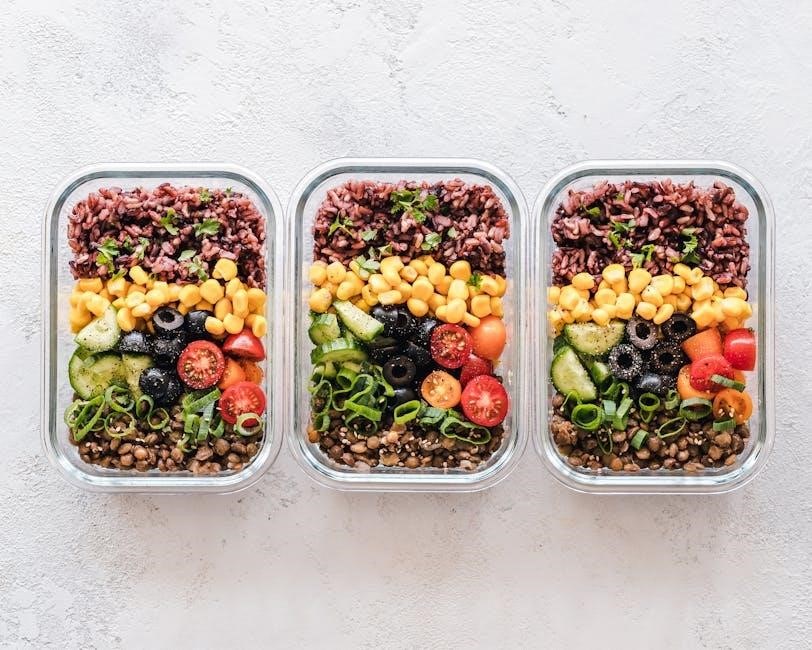
adrenal fatigue meal plan pdf
Adopting an adrenal fatigue meal plan is essential for balancing nutrition, managing stress on adrenal glands, and restoring energy. A structured diet helps stabilize cortisol levels, promoting hormonal balance and overall well-being. By focusing on nutrient-dense foods and avoiding stimulants, individuals can support adrenal health effectively, leading to improved vitality and resilience.

Understanding Adrenal Fatigue
Adrenal fatigue is a condition where adrenal glands struggle to produce sufficient hormones, leading to low energy and impaired stress response. A structured diet can help alleviate symptoms and support recovery.
What is Adrenal Fatigue?

Adrenal fatigue is a condition where the adrenal glands fail to produce adequate hormones, leading to persistent fatigue, low energy, and difficulty managing stress. It often results from chronic stress, poor nutrition, or prolonged illness. Symptoms include morning fatigue, energy crashes, and heightened sensitivity to stress. Cortisol levels, typically highest in the morning, may drop significantly, disrupting the body’s natural rhythm. While not medically recognized as a disorder, adrenal fatigue is widely acknowledged as a functional issue impacting overall health. Addressing it involves lifestyle changes, including a tailored diet, to support adrenal function and restore energy balance; Understanding its causes and symptoms is the first step toward recovery and improving quality of life.
The Role of Diet in Managing Adrenal Fatigue
Diet plays a pivotal role in managing adrenal fatigue by providing essential nutrients that support adrenal function and reduce stress on the glands. A well-structured meal plan helps stabilize cortisol levels, preventing energy crashes and improving overall resilience. Avoiding stimulants like caffeine and sugar is crucial, as they can overburden the adrenal glands. Incorporating nutrient-dense foods, such as lean proteins, whole grains, and colorful vegetables, ensures the body has the resources to heal and function optimally. Hydration and healthy fats are also vital for hormone production and energy balance. By focusing on whole, unprocessed foods, individuals can create a foundation for recovery and long-term adrenal health. A tailored diet not only addresses symptoms but also supports the body’s natural ability to regulate stress and maintain vitality.

Meal Planning Strategy for Adrenal Fatigue
A well-designed meal plan helps stabilize energy levels, supports adrenal health, and promotes recovery by balancing macronutrients and avoiding foods that trigger stress or inflammation.
Timing Your Meals for Optimal Energy
Timing your meals is crucial for managing adrenal fatigue, as it helps stabilize energy levels and supports adrenal function. Eating breakfast within an hour of waking is essential to jumpstart metabolism and balance cortisol levels. For individuals in different stages of adrenal fatigue, meal timing may vary—those with high morning cortisol should eat earlier, while those with low cortisol may benefit from delayed breakfast. Spacing meals evenly throughout the day prevents energy crashes and maintains steady adrenal support. Avoiding stimulants like caffeine and sugar is vital, as they can disrupt adrenal balance. Eating a light dinner and avoiding heavy meals close to bedtime can also promote better sleep and adrenal recovery. Consistent meal timing helps regulate the body’s natural rhythms, fostering overall well-being and energy resilience.
The Importance of Breakfast in Adrenal Fatigue
BREAKFAST plays a vital role in managing adrenal fatigue, as it helps regulate cortisol levels and provides the body with essential nutrients after an overnight fast. Eating within the first hour of waking is recommended to stabilize energy and support adrenal function. A balanced breakfast should include protein, healthy fats, and complex carbohydrates to maintain blood sugar levels and prevent energy crashes. Skipping breakfast can disrupt adrenal rhythms, leading to fatigue and hormonal imbalances. Incorporating nutrient-dense foods like eggs, avocado, or whole grains can help replenish depleted nutrients and support adrenal recovery. Avoiding stimulants like caffeine and sugar at breakfast is crucial to maintain steady energy levels throughout the day. Prioritizing breakfast is a cornerstone of an effective adrenal fatigue meal plan, ensuring a strong foundation for overall wellness.

Creating an Eating Schedule to Support Adrenal Health
Establishing a consistent eating schedule is crucial for managing adrenal fatigue, as it helps regulate cortisol production and maintain steady energy levels throughout the day. Aim to eat smaller, balanced meals every 2-3 hours to avoid blood sugar fluctuations and prevent adrenal stress. Start your day with a nutritious breakfast within an hour of waking to kickstart your metabolism. Include protein, healthy fats, and complex carbohydrates in each meal to provide sustained energy. Avoid eating heavy meals close to bedtime, as this can disrupt digestion and adrenal recovery. A structured eating schedule not only supports adrenal function but also helps reduce fatigue and improves overall resilience. Consistency is key to balancing hormones and promoting long-term adrenal health.
Why Avoiding Stimulants is Crucial
Avoiding stimulants is essential for managing adrenal fatigue, as they can overburden the adrenal glands and disrupt hormonal balance. Stimulants like caffeine, sugar, and alcohol trigger a stress response, causing the adrenal glands to produce excess cortisol. Over time, this can lead to adrenal exhaustion, worsening fatigue and energy crashes. Eliminating these substances helps stabilize cortisol levels and reduces unnecessary stress on the adrenal glands. Additionally, stimulants often cause energy spikes followed by crashes, which can further destabilize adrenal function. By cutting out stimulants, individuals can promote adrenal recovery, improve energy production, and support long-term hormonal health. This step is vital for creating a balanced and sustainable adrenal fatigue meal plan.

Foods to Include and Avoid
Selecting the right foods is crucial for adrenal health. Focus on nutrient-dense options like whole grains, lean proteins, and colorful vegetables to support energy and balance.

Nutrient-Dense Foods for Adrenal Support
Nutrient-dense foods play a vital role in supporting adrenal health. Whole grains like quinoa and brown rice provide fiber and B vitamins, essential for energy production. Lean proteins, such as chicken, fish, and eggs, supply amino acids that help regulate hormones. Colorful vegetables like spinach, bell peppers, and carrots are rich in antioxidants and vitamins that combat stress. Healthy fats, including avocado, nuts, and olive oil, support hormone balance and reduce inflammation. Fermented foods like yogurt and kimchi promote gut health, which is linked to adrenal function. Incorporating these foods helps stabilize cortisol levels, reduces fatigue, and replenishes nutrients depleted by adrenal stress. Avoiding stimulants and processed foods further supports adrenal recovery and overall well-being.
Foods to Avoid When Managing Adrenal Fatigue

When managing adrenal fatigue, certain foods can exacerbate symptoms and hinder recovery. Stimulants like caffeine, alcohol, and nicotine should be avoided, as they overburden the adrenal glands and disrupt hormone balance. Processed foods, sugary snacks, and refined carbohydrates cause blood sugar spikes and crashes, further depleting energy. Foods high in sodium, such as processed meats and canned goods, can increase blood pressure and stress on the body. Additionally, artificial additives and preservatives in junk food inflame the body and slow healing. Eliminating these foods helps reduce adrenal stress, stabilize cortisol levels, and promote overall well-being. By focusing on whole, nutrient-rich foods, individuals can better support adrenal health and regain vitality.

Putting it All Together
Creating a balanced meal plan with timed nutrition supports adrenal health, stabilizes energy, and enhances vitality. Organizing meals and snacks promotes long-term well-being and resilience.

A Sample Adrenal Fatigue Meal Plan
A sample adrenal fatigue meal plan focuses on nutrient-dense foods to support energy and hormonal balance. Start with breakfast within an hour of waking, such as scrambled eggs with spinach, avocado, and a side of fresh berries. Mid-morning, snack on raw almonds and an apple. For lunch, include grilled chicken salad with mixed greens, cherry tomatoes, and olive oil dressing. In the afternoon, have a small portion of hummus with veggie sticks; Dinner might feature baked salmon, quinoa, and steamed broccoli. Avoid stimulants like caffeine and sugar, and stay hydrated with herbal teas or water. This structured approach helps stabilize cortisol levels and supports adrenal recovery, ensuring sustained energy throughout the day.
Creating a Personalized Shopping List
Creating a personalized shopping list is crucial for managing adrenal fatigue effectively. Focus on including nutrient-dense foods like fresh vegetables, lean proteins, whole grains, and healthy fats. Avoid processed foods, refined sugars, and stimulants that can exacerbate adrenal stress. Consider your dietary preferences and needs, such as gluten-free or dairy-free options, to tailor the list. Prioritize organic and seasonal produce to maximize nutritional value. Incorporate adrenal-supporting snacks like nuts, seeds, and fresh fruits. Review and update your list regularly to ensure variety and alignment with your meal plan. Consulting with a healthcare provider or nutritionist can further customize the list to address specific deficiencies or sensitivities. A well-organized shopping list ensures you stay on track with your adrenal fatigue diet, promoting balance and vitality.